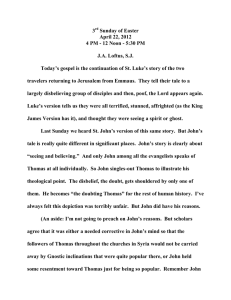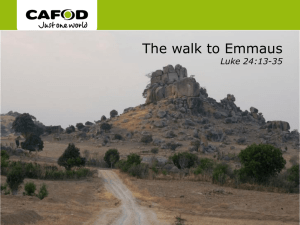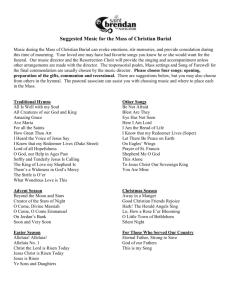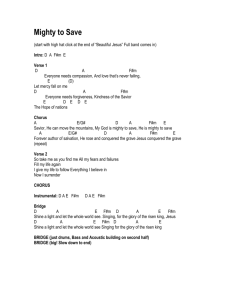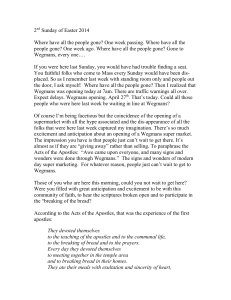3 Sunday of Easter April 19, 2015 10 AM Liturgy
advertisement
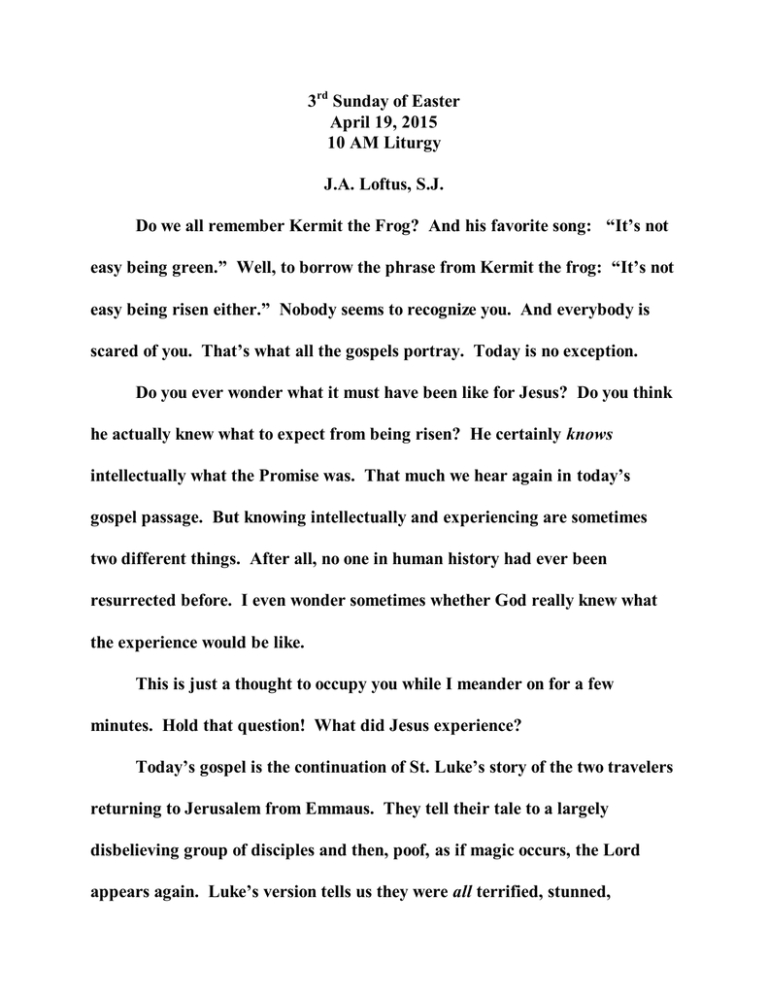
3rd Sunday of Easter April 19, 2015 10 AM Liturgy J.A. Loftus, S.J. Do we all remember Kermit the Frog? And his favorite song: “It’s not easy being green.” Well, to borrow the phrase from Kermit the frog: “It’s not easy being risen either.” Nobody seems to recognize you. And everybody is scared of you. That’s what all the gospels portray. Today is no exception. Do you ever wonder what it must have been like for Jesus? Do you think he actually knew what to expect from being risen? He certainly knows intellectually what the Promise was. That much we hear again in today’s gospel passage. But knowing intellectually and experiencing are sometimes two different things. After all, no one in human history had ever been resurrected before. I even wonder sometimes whether God really knew what the experience would be like. This is just a thought to occupy you while I meander on for a few minutes. Hold that question! What did Jesus experience? Today’s gospel is the continuation of St. Luke’s story of the two travelers returning to Jerusalem from Emmaus. They tell their tale to a largely disbelieving group of disciples and then, poof, as if magic occurs, the Lord appears again. Luke’s version tells us they were all terrified, stunned, affrighted (as the King James Version has it), and thought they were seeing a spirit or ghost. Why is it that just about everyone has trouble recognizing the Risen Lord? Magdalene thinks he is the gardener. The travelers on the road to Emmaus think he is a stranger. These eleven in the Upper Room think he is a ghost. Everyone has a hard time recognizing him. There might be a message in here for us. Let’s see for ourselves. Last Sunday we heard St. John’s version of this same story. But John’s tale is really quite different in significant places. John’s story is clearly about “seeing and believing.” And only John among all the evangelists speaks of Thomas at all individually. So John singles-out Thomas to illustrate his theological point. The disbelief, the doubt, gets shouldered by only one of them. He becomes “the doubting Thomas” for the rest of human history. I’ve always felt this depiction was terribly unfair. But John did have his reasons. That’s just other whole homily and one that I’ve already preached before. So let’s come back to Luke in today’s gospel. As I said, notice that here everyone is in doubt, is frightened (terrified in most translations), and feels stunned. And there is no “week later” individual conversation with Thomas about Jesus’ hands and feet. No, here Jesus himself suggests they all touch 2 him. And then he eats some broiled fish with them–clearly implying “I am not a spirit or ghost.” Watch me eat! Then Jesus ever so gently breaks open the scriptures for them in that Upper Room just as he had for the two on the road to Emmaus. No one is castigated for not believing. No one is admonished about having doubts. Jesus seems to know that experiencing himself in his risen life does not provide for an easy adventure. It’s not easy being risen! A marvelous Presbyterian minister and spiritual guide, Frederick Buechner, writes this: “Whether your faith is that there is a God or that there is not a God, if you don’t have any doubts you are either kidding yourself or asleep. Doubts are the ants in the pants of faith. They keep it awake and moving.” (Beyond Words) For those of a more philosophical and poetic bent, the great Basque novelist, philosopher, and poet Miguel Unamuno is even more succinct: “Faith which does not doubt is dead faith.” St. Luke in his characteristic way is the gentle healer here–and he is speaking directly as much to us as to his first listeners. Jesus understands, in Luke’s version, that his risen presence is sometimes incredulous. For every one person who can genuinely bask in the glow of our new Paschal candle, there are 3 ten others who just try real hard to experience a smidge of what all the hoopla is all about. But each one of the post-Resurrection narratives offers us hints. When does Mary recognize who the gardener really is? When she hears her name called. All it takes is the one word, “Mary.” Her love is ignited again. How does the Beloved Disciple recognize the stranger on the beach before anyone else? Because he is “the Beloved;” he loves first and then he sees. When do the two travelers on the road see? When he breaks the bread and shares the cup with them. That they treasure in their memory, and their love is re-kindled. Love is the key always. It’s not a question of eyesight. So where is the risen Jesus today? Where, for us? Wherever and whenever we, too, love. But we have to really love: not just in words but also in practical deeds. Why? Matthew 25 sums it up well. Because whenever we see the hungry or thirsty; whenever we see those naked or in prison; whenever we really encounter the poor in our midst and actually do something: we hear Jersus say: you did it to me. It really is not easy being risen. I still hurt and wait for completion in you, He says. People’s real lives are often complex and frequently heavy and 4 burdened. It was true for those first disciples. And it is still true for many of us. We all have our own losses and disappointments, and our own deaths. Ands life can become quite depressing at times. So if singing lots of extra Alleluias just gets you down rather than up.... If you find yourself still trying to actually experience the Paschal joy and peace of the season.... If you can’t even bring yourself to say one more “Alleluia.” Know you are in good company. “It’s not easy being Risen. It scares people. And it should. There is a still lot of love to do! But hear again: I am, and will be, with you until the end of time–really! And for that gift, maybe we can mutter one more quiet Alleluia. Peace be with you! 5
